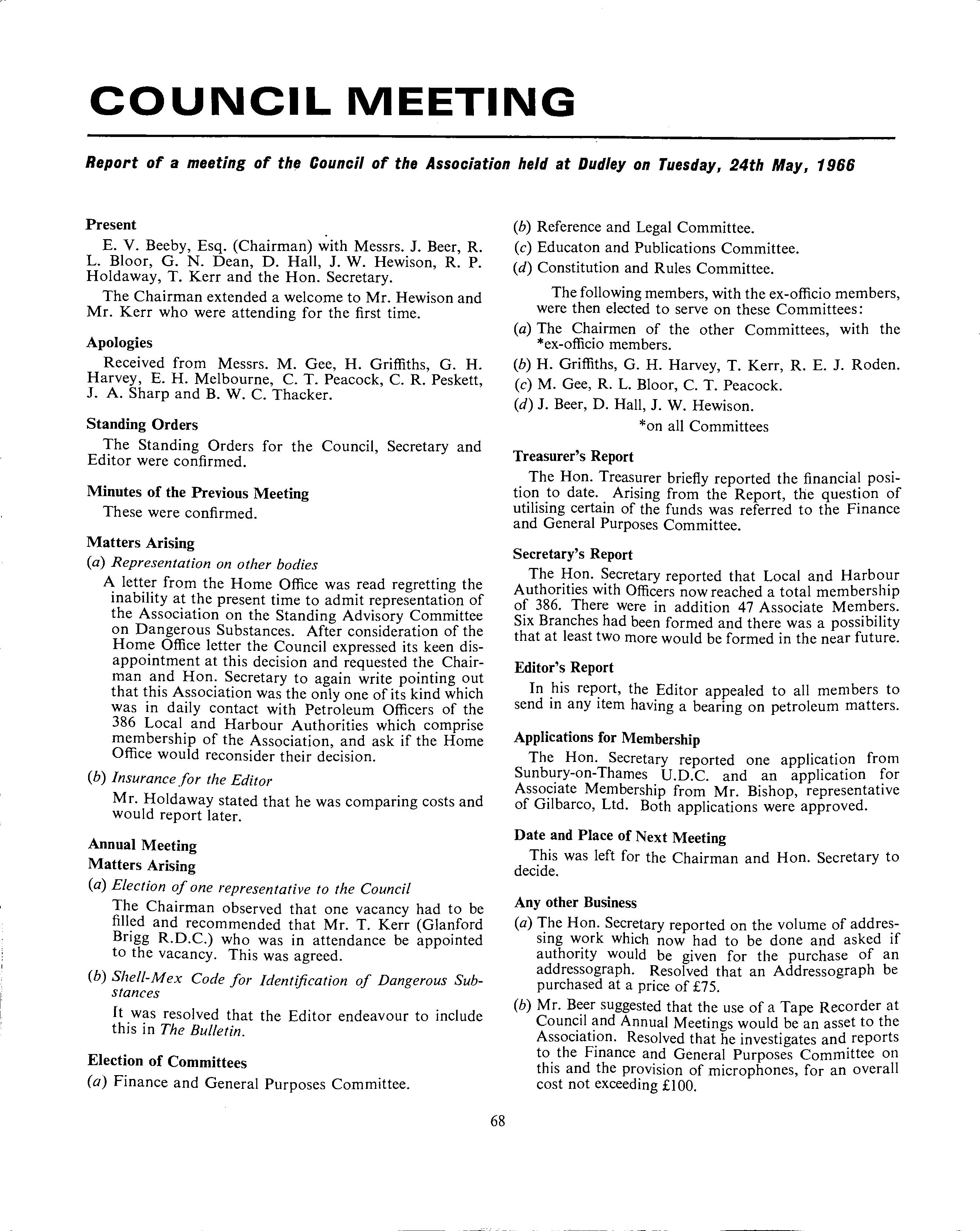
20 minute read
COUNCIL MEETING-DUDLEY-24TH MAY, 1966
by apeauk
COUNCIL MEETING
Report of a meeting of the Council of the Association held at Dudley on Tuesday, 24th May, 1966
Advertisement
Present
E. V. Beeby, Esq. (Chairman) with Messrs. J. Beer, R. L. Bloor, G. N. Dean, D. Hall, J. W. Hewison, R. P. Holdaway, T. Kerr and the Hon. Secretary.
The Chairman extended a welcome to Mr. Hewison and Mr. Kerr who were attending for the first time.
Apologies
Received from Messrs. M. Gee, H. Griffiths, G. H. Harvey, E. H. Melbourne, C. T. Peacock, C.R. Peskett, J. A. Sharp and B. W. C. Thacker.
Standing Orders
The Standing Orders for the Council, Secretary and Editor were confirmed.
Minutes of the Previous Meeting
These were confirmed.
Matters Arising (a) Representation on other bodies
A letter from the Home Office was read regretting the inability at the present time to admit representation of the Association on the Standing Advisory Committee on Dangerous Substances. After consideration of the
Home Office letter the Council expressed its keen disappointment at this decision and requested the Chairman and Hon. Secretary to again write pointing out that this Association was the only one of its kind which was in daily contact with Petroleum Officers of the 386 Local and Harbour Authorities which comprise membership of the Association, and ask if the Home
Office would reconsider their decision. (b) Insurance for the Editor
Mr. Holdaway stated that he was comparing costs and would report later.
Annual Meeting Matters Arising (a) Election of one representative to the Council
The Chairman observed that one vacancy had to be filled and recommended that Mr. T. Kerr (Glanford
Brigg R.D.C.) who was in attendance be appointed to the vacancy. This was agreed. (b) Shell-Mex Code for Identification of Dangerous Substances
It was resolved that the Editor endeavour to include this in The Bulletin.
Election of Committees (a) Finance and General Purposes Committee. (b) Reference and Legal Committee. (c) Educaton and Publications Committee. (d) Constitution and Rules Committee. The following members, with the ex-officio members, were then elected to serve on these Committees: (a) The Chairmen of the other Committees, with the *ex-officio members. (b) H. Griffiths, G. H. Harvey, T. Kerr, R. E. J. Roden. (c) M. Gee, R. L. Bloor, C. T. Peacock. (d) J. Beer, D. Hall, J. W. Hewison. *on all Committees
Treasurer's Report
The Hon. Treasurer briefly reported the financia~ position to date. Arising from the Report, the quest~on of utilising certain of the funds was referred to the Fmance and General Purposes Committee.
Secretary's Report
The Hon. Secretary reported that Local and Harbo1;1r Authorities with Officers now reached a total memberslup of 386. There were in addition 47 Associate Members. Six Branches had been formed and there was a possibility that at least two more would be formed in the near future.
Editor's Report
In his report, the Editor appealed to all members to send in any item having a bearing on petroleum matters.
Applications for Membership
The Hon. Secretary reported one application from Sunbury-on-Thames U.D.C. and an application for Associate Membership from Mr. Bishop, representative of Gilbarco, Ltd. Both applications were approved.
Date and Place of Next Meeting
This was left for the Chairman and Hon. Secretary to decide.
Any other Business (a) The Hon. Secretary reported on the volume of addre~sing work which now had to be done and asked 1f authority would be given for the purchase of an addressograph. Resolved that an Addressograph be purchased at a price of £75. (b) Mr. Beer suggested that the use of a Tape Recorder at
Council and Annual Meetings would be an asset to the
Association. Resolved that he investigates and reports to the Finance and General Purposes Committee on this and the provision of microphones, for an overall cost not exceeding £100.
68
IBranch Meetings I
= = ••••••••••••••••••••••••••••••••••••WW8•••••••••••••••••••••••••••••••••••••••••••••••••••••••H•••••••••••-••••-tft
SOUTH EASTERN
A meeting of the South Eastern Branch of the Association was held at Leatherhead on Wednesday, 23rd March, 1966. Present were the Chairman, Mr. F. L. Barker, Esher U.D.C. and 48 members.
Discussion
A paper on "Electrical equipment in danger areas" was presented by Mr. W. C. R. Dale, A.F.l.P., Administrative Officer, Licensing Dept., Greater London Council. The paper provoked a lively and lengthy discussion on many points and from the chair Mr. Barker thanked Mr. Dale for his interesting and informative paper.
Committee Report
The report of the Branch Committee Meeting held on the 19th January, 1966, was circulated with the recommendation that "the use of coin operated petrol pumps should be limited to adequately supervised sites". The re-licensing of sub-standard sites swing arms, was discussed and reference was agam made to the various means available to licensing authorities to limit re-licensing, e.g. non-transfer of licence.
Next Meeting
The next meeting of the Branch is to be held on Wednesday, 6th July, 1966.
Visit
On Wednesday, 11 th May, J 966, twenty members the works of Messrs. Minimax, Ltd., of Feltham, sex, at the kind invitation of the Company and m !he afternoon saw a programme of demonstrat10ns showmg how various types of by. the Company could deal effectively )V1th tires mvolvmg various materials, including petroleum.
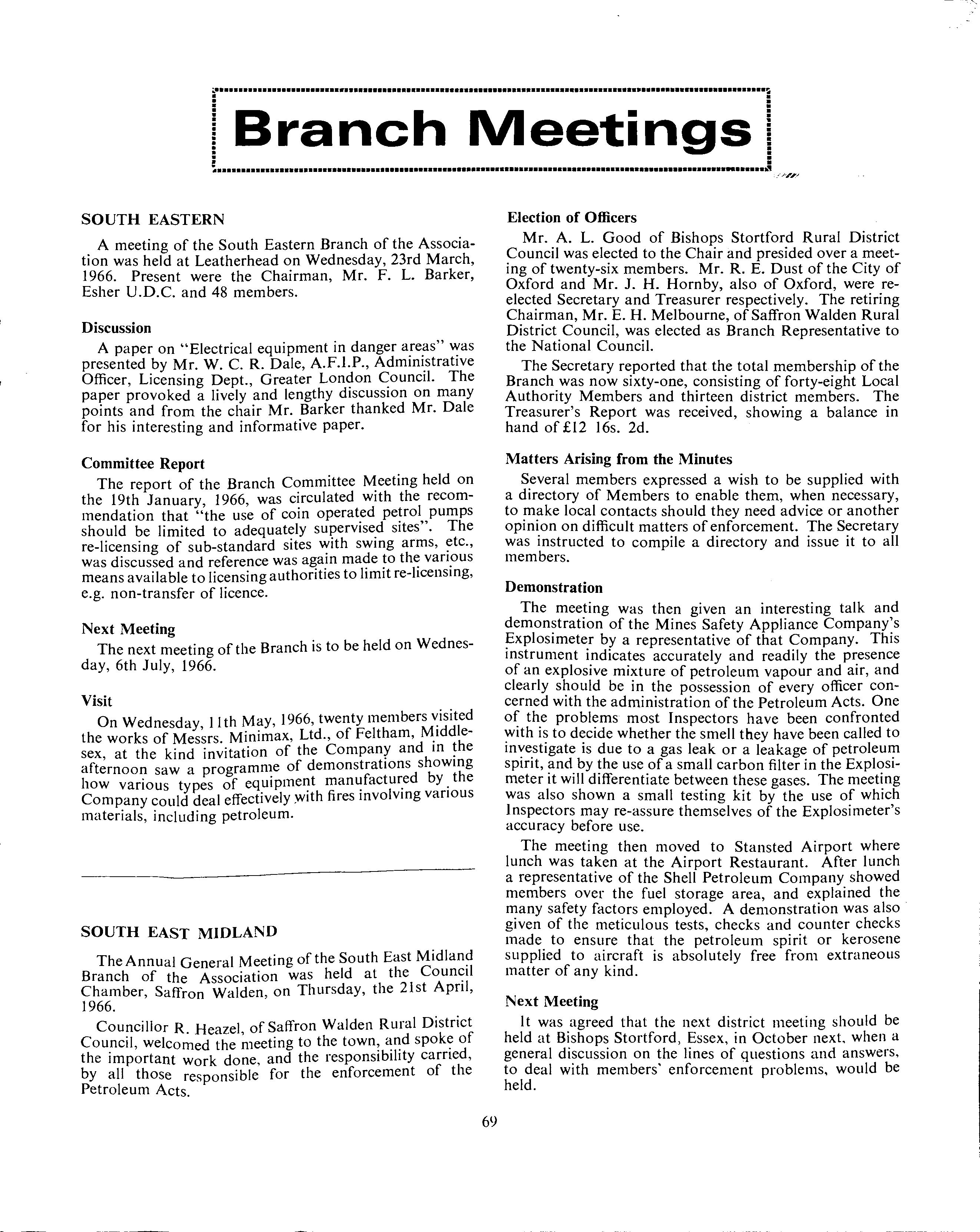
SOUTH EAST MIDLAND
The Annual General Meeting of the South East Midlan? Branch of the Association was held at the Chamber, Saffron Walden, on Thursday, the 2lst Apnl, 1966.
Councillor R. Heazel, of Saffron Walden Rural District Council, welcomed the meeting to the town, and spoke of the important work done, and the responsibility carried, by all those responsible for the enforcement of the Petroleum Acts. Election of Officers
Mr. A. L. Good of Bishops Stortford Rural District Council was elected to the Chair and presided over a meeting of twenty-six members. Mr. R. E. Dust of the City of Oxford and Mr. J. H. Hornby, also of Oxford, were reelected Secretary and Treasurer respectively. The retiring Chairman, Mr. E. H. Melbourne, of Saffron Walden Rural District Council, was elected as Branch Representative to the National Council.
The Secretary reported that the total membership of the Branch. was now sixty-one, consisting of forty-eight Local Authority Members and thirteen district members. The Treasurer's Report was received, showing a balance in hand of £12 16s. 2d.
Matters Arising from the Minutes
Several members expressed a wish to be supplied with a directory of Members to enable them, when necessary, to make local contacts should they need advice or another opini.on on difficult matters of enforcement. The Secretary was mstructed to compile a directory and issue it to all members.
Demonstration
The was then given an interesting talk and of the Mines Safety Appliance Company's by a representative of that Company. This mstrument mdicates accurately and readily the presence of an explosive mixture of petroleum vapour and air, and clearly should be in the possession of every officer concerned with the administration of the Petroleum Acts. One of the problems most Inspectors have been confronted to whether the smell they have been called to 1s due to a gas leak or a leakage of petroleum spmt, by !he use _of a small carbon filter in the Explosimeter 1t will differentiate between these gases. The meeting was also shown a small testing kit by the use of which Inspectors may re-assure themselves of the Explosimeter's accuracy before use.
The meeting then moved to Stansted Airport where lunch was taken at the Airport Restaurant. After lunch a representative of the Shell Petroleum Company showed members over the fuel storage area, and explained the many safety factors employed. A demonstration was also · given of the meticulous tests, checks and counter checks made to ensure that the petroleum spirit or kerosene supplied to aircraft is absolutely free from extraneous matter of any kind.
Next Meeting
It was agreed that the next district meeting should be held at Bishops Stortford, Essex, in October next, when a general discussion on the lines of questions and answers, to deal with members' enforcement problems, would be held.
69
Through the· Pipeline
by 0 I I 0
WHAT'S IN A FLASH ?
Not only is there argument on whether the term "flammable" or "inflammable" should be applied to liquids exhibiting due fiery tendencies. but there is also no little confusion on the tests to be applied to measure these tendencies.
Under the Petroleum Acts, the position is quite clear: a petroleum having a flash point below 73° Fahrenheit is a petroleum spirit and is highly "inflammable". The flash point is the temperature at which the liquid gives off sufficient inflammable vapour to support a momentary flash of flame when ignited by extraneous f!leai:is and the apparatus and method specified for determmat10n of the phenomonen is the Abel Closed Cup Apparatus and Method.
Why then the peculiar figure of 73° Fahrenheit ? Because Abel once had an Open Cup Method and Apparatus and the 'limit laid down using these was the nice round number of 100° Fahrenheit. Unfortunately the draughty rooms of Victoriana caused not inconsiderable variations in results so the apparatus was suitably enclosed and the modern Closed Cup Method was born. So far as anyone could determine 100° Fahrenheit Open Cup was equivalent to 73° Fahrenheit Closed Cup-such is the precision of scientists and, one supposes, lawyers !
Not to be left out in the cold, the American and the French have their methods too ! The Americans have Pensky-Marten and the French Luchaire. The results of each vary by a degree or two but if you are not a scientist or a lawyer, what is a degree or so amongst allies ? At least, all are closed cup methods and since Abel cannot determine flash points above about 100° Fahrenheit, Pensky-Marten has its uses.
There is, however, still room for individuality and in this the Factories Department of the Ministry of Labour must surely reign supreme. They scrapped the term "inflammable" and the fire point test so beloved und~r the Factories Act 1937 and have now adopted the Amencanism "flammable" and a flash point test. You might argue that the adoption of the flash point test in their Memorandum of 1960 was a forward looking step but unfortunately the test required is the Pensky-Marten Open Cup Method and Apparatus. Maybe no cold winds blow along their corridors of power, or maybe only the Home Office (or Cain ?) recognises Abel !
Fire point, incidentally, is the temperature at w~ich a liquid gives off sufficient vapour to support contmuous combustion once the vapour has been lit. It should not be confused with the auto-ignition temperature which is the temperature at which spontaneous ignition takes place. WHERE'S THE PROOF '!
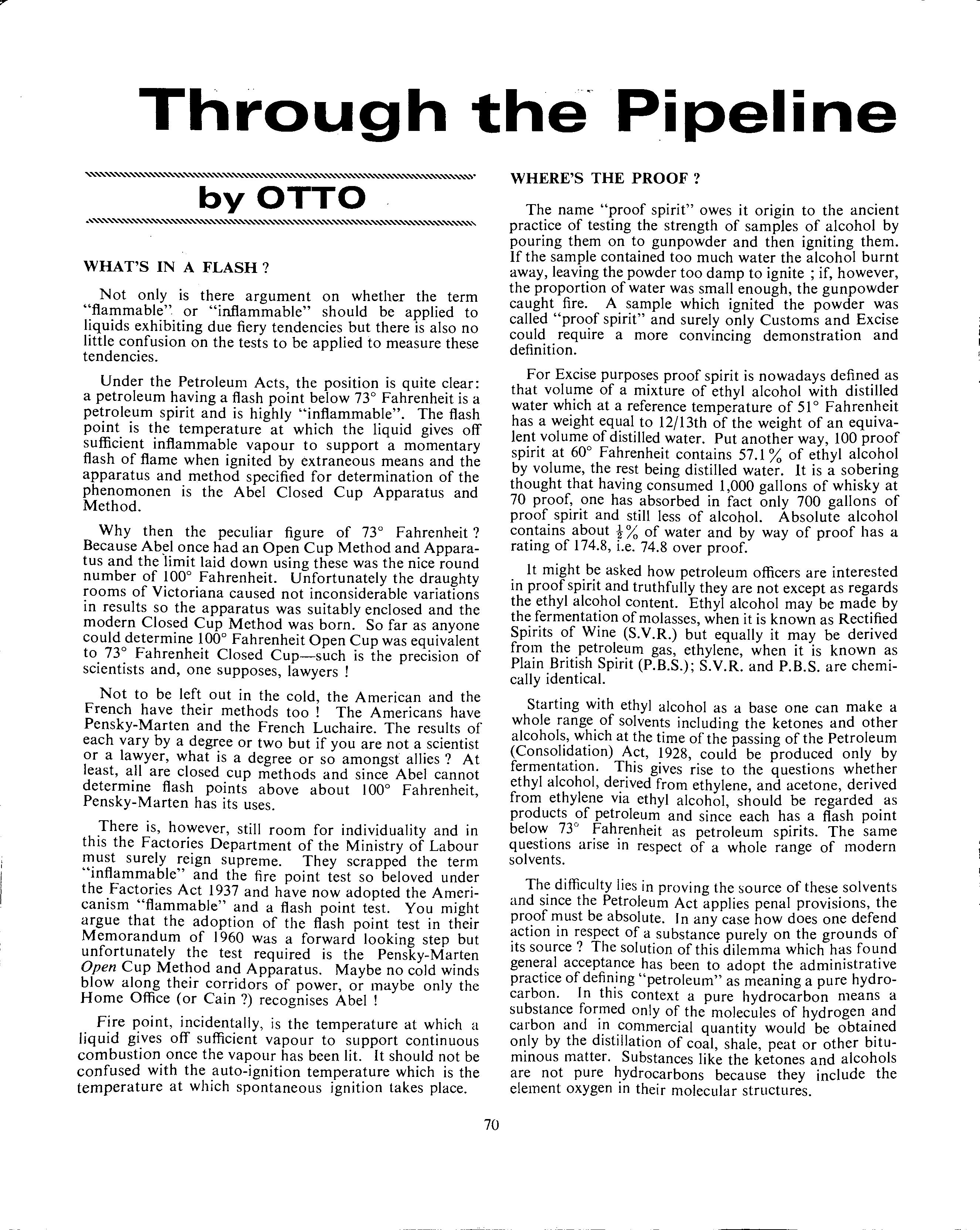
The name "proof spirit" owes it origin to the ancient practice of testing the strength of samples _of .a~cohol by pouring them on to gunpowder and then 1gmtmg them. If the sample contained too much wat~r t~e al~ohol burnt away, leaving the powder too damp to 1gmte ; 1f, however, the proportion of water was small enough, the gunpowder caught fire. A sample which ignited the powder "".as called "proof spirit" and surely only Customs an_d Excise could require a more convincing demonstration and definition.
For Excise purposes proof spirit is nowaday~ defi!1e~ as that volume of a mixture of ethyl alcohol with d1sttlle~ water which at a reference temperature of 51° Fahren~e1t has a weight equal to 12/13th of the weight of an eqmvaIent volume of distilled water. Put another way, 100 proof spirit at 60° Fahrenheit contains 57. l % of ~thyl alco~ol by volume, the rest being distilled water. It 1s a so_benng thought that having consumed 1,000 gallons of whisky at 70 proof, one has absorbed in fact only 700 gallons of proof spirit and still less of alcohol. Absolute alcohol contains about t /~ of water and by way of proof has a rating of 174.8, i.e. 74.8 over proof. lt might be asked how petroleum officers are interested in proof spirit and truthfully they are not except as regards the ethyl alcohol content. Ethyl alcohol may be mad~ by the fermentation of molasses, when it is known as Rectified Spirits of Wine (S.V.R.) but equally it may be derived from the petroleum gas, ethylene, when it is known ~s Plain British Spirit (P.B.S.); S.V.R. and P.B.S. are chemically identical.
Starting with ethyl alcohol as a base one can make a whole range of solvents including the ketones and other alcohols, which at the time of the passing of the Petroleum (Consolidation) Act, 1928, could be produced only by fermentation. This gives rise to the questions whe~her ethyl alcohol, derived from ethylene, and acetone, denved from ethylene via ethyl alcohol, should be regarded . as products of petroleum and since each has a flash pomt below 73° Fahrenheit as petroleum spirits. The same questions arise in respect of a whole range of modern solvents.
The difficulty lies in proving the source of the~e.solvents and since the Petroleum Act applies penal prov1s1ons, the proof must be absolute. Jn any case how does one defend action in respect of a substance purely on the grounds of its source? The solution of this dilemma which has found general accepta~ce has been to adopt t~e administrative practice of definmg "petroleum" as meamng a pure hydrocarbon. In this context a pure hydrocarbon means a substance formed only of the molecules of hydrogen _and carbon and in commercial quantity would be obta1~ed only by the distillation of coal, shale, peat or other bituminous matter. Substances like the ketones and alcohols are not pure hydrocarbons because they include the element oxygen in their molecular structures.
70
HIGH COURT OF JUSTICE : QUEEN'S BENCH DIVISION
Appeal Case
PETROL TANKER NOT 1 PREMIS.ES'
GRANDI AND ANOTHER v. MILBURN
Before the LORD CHIEF JUSTICE, MR. JUSTICE MARSHALL and MR. JUSTICE JAMES.
The Divisional Court allowed this appeal by European Petroleum Distributors, Ltd., of Bucklesbury House E.C. against their conviction, on December 2nd, 1965, by Dartford Magistrates' Court, on an information that they, on August 30th, 1965, at St. Bernard's Stores, Main Road West Kingsdown, Kent, "were the occupiers of premises: namely a petrol tanker" in which petroleum-spirit was kept without an authorizing licence, contrary to section I of the Petroleum (Consolidation) Act, 1928.
The Court also dismissed appeals against three other convictions, one by Mr. Robert John Grandi, roadside cafe proprietor, of St. Bernard's Stores, of being the occupier of the premises on which petroleum spirit was "kept" without such a licence, and of the company for aiding and abetting the commission of that offence, and also, of a contravention of regulation 9 of the PetroleumSpirit (Carriage by Road) Regulations, 1957 (S.I. 1957 No. 191) in replenshing the fuel tank of a motor car, with petroleum-spirit direct from a vehicle, "namely, a petrol tanker conveying petroleum-spirit in such circumstances that the Regulations applied to that conveyance".
Mr. Grandi was fined £5, the company a total of £15.
Mr. Alaistair Morton appeared for the appellants; Mr. Alan Fletcher for the respondent, Mr. James Henry Milburn, clerk to the Dartford Rural District Council.
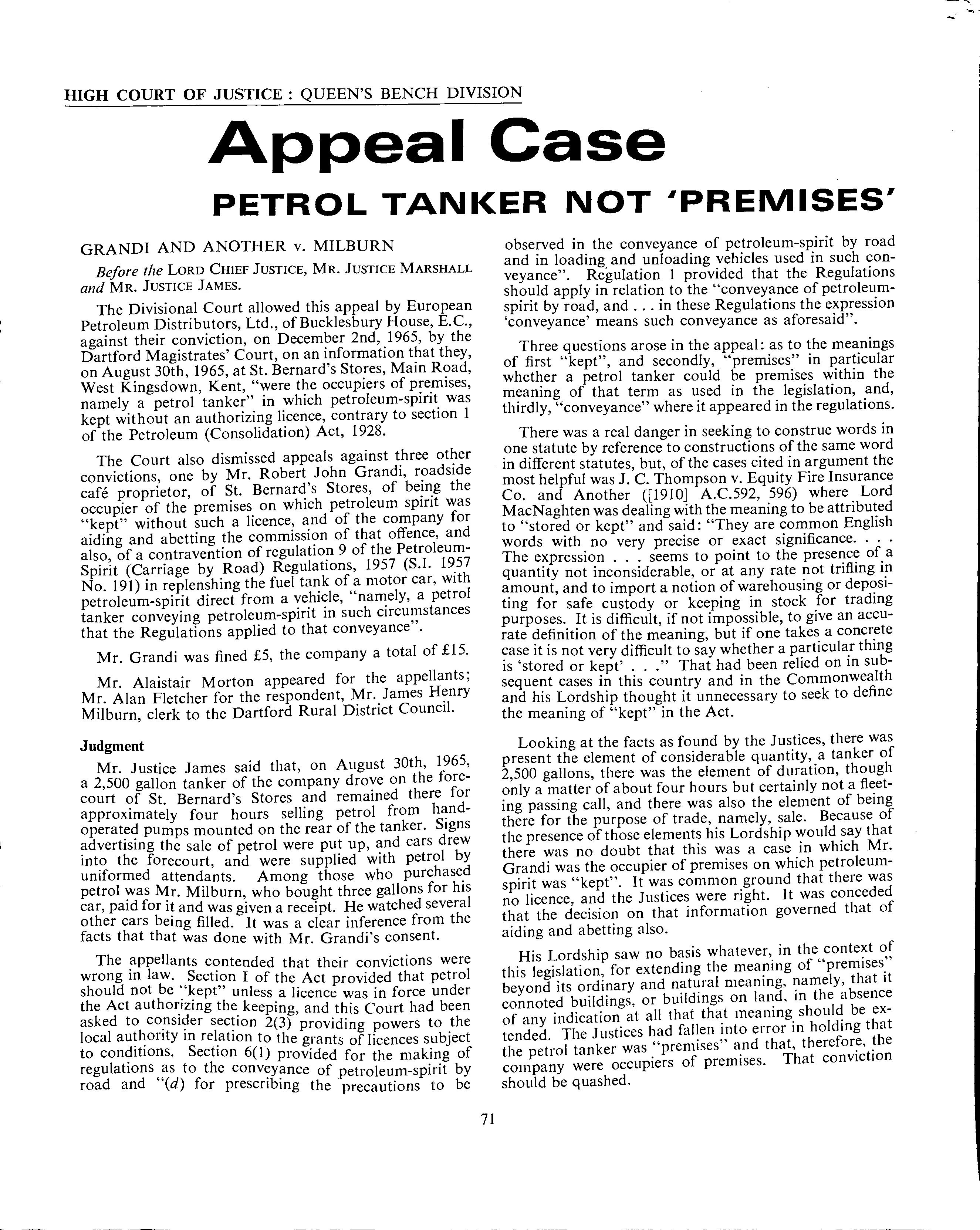
Judgment
Mr. Justice James said that, on August 30th, 1965, a 2,500 gallon tanker of the company drove on the forecourt of St. Bernard's Stores and remained there for approximately four hours selling petrol from handoperated pumps mounted on the rear of the tanker. Signs the sale of petrol were put up, and cars drew mt? the forecourt, and were supplied with petrol by uniformed attendants. Among those who purchased petrol Milburn, who bought three gallons for his car, paid for I! and was given a receipt. He watched several other cars be mg filled. It was a clear inference from the facts that that was done with Mr. Grandi's consent.
The contended that their convictions were wrong m law. Section I of the Act provided that petrol should not be unless a licence was in force under the Act authoi:1zmg the_ keeping, and this Court had been asked to consider section 2(3) prov"d· t th local authority in relation to the gra it mgf 1powers 0b. et t d.t. s · n s o 1cences su 0 con. 1 wns. echon 6(1) provided for the making of regulat10ns as to the conveyance of road and "(d) '-" . . ior prescnbmg the p t. I · ·t _ e 10 eum-spm precautions to b y be in. the conveyance of petroleum-spirit by road and m loadmg_ and unloading vehicles used in such conveyance". Regulation 1 provided that the Regulations sh?1;1ld apply in relation to the "conveyance of petroleumspmt by road, and ... in these Regulations the expression 'conveyance' means such conveyance as aforesaid".
Three questions arose in the appeal: as to the meanings of first "kept'', and secondly, "premises" in particular a petrol tanker could be premises within the meamng of that term as used in the legislation and thirdly, "conveyance" where it appeared in the
There was a real danger in seeking to construe words in one statute by reference to constructions of the same word in different statutes, but, of the cases cited in argument the most helpful was J.C. Thompson v. Equity Fire Insurance Co. and Another ([1910] A.C.592, 596) where Lord MacNaghten was dealing with the meaning to be attributed to or kept" and said: "They are common English words with no very precise or exact significance. . . . The . . . seems to point to the presence of a quantity not inconsiderable, or at any rate not trifling in a_mount, and to import a notion of warehousing or depositing for safe. custody or keeping in stock for trading purposes .. !t IS difficult, if not impossible, to give an accurate of the meaning, but if one takes a concrete
It IS not very difficult to say whether a particular thing ts 'stored or kept' . . . " That had been relied on in subsequent cases in this country and in the Commonwealth and his Lordship thought it unnecessary to seek to define the meaning of "kept" in the Act.
Looking at the facts as found by the Justices, there was present the element of considerable quantity, a tanker of 2,500 gallons, there was the element of duration, though only a matter of about four hours but certainly not a fleeting passing call, and there was also the element of being there for the purpose of trade, namely, sale. Because of the presence of those elements his Lordship would say that there was no doubt that this was a case in which Mr. Grandi was the occupier of premises on which petroleumspirit was "kept". It was common ground that there was no licence, and the Justices were right. It was conceded that the decision on that information governed that of aiding and abetting also.
His Lordship saw no basis whatever, in the context of this legislation, for extending the meaning of "premises" beyond its ordinary and natural meaning, namely, that it connoted buildings, or buildings on land, in the absence of any indication at all that that meaning should be extended. The Justices had fallen into error in holding that the petrol tanker was "premises" and that, therefore, the company were occupiers of premises. That conviction should be quashed.
71
As to the remaining information, no authority had been cited governing that situation, but one did not need authority. The words were quite plain, and where the facts were that petroleum-spirit was loaded into a petrol tanker so that that petrol tanker could carry that spirit by road, then the "conveyance of petroleum-spirit by road" took place from that time on until the petrol tanker was emptied of its load.
There could be, at one and the same time, a "conveyance of petroleum-spirit by road", and that petroleum-spirit being "kept" on premises. If one said that conveyance by road came to an end when the petrol tanker remained stationery for four hours, then all the provisions of the Regulations designed to secure the safety of the From "The Times", 20th May, 1966
LEGAL PROCEEDINGS
LID OF TIN BLOWN 200 YARDS
A factory worker applied an oxy-acetylene torch to a large tin drum. There was an explosion which blew the lid into a neighbouring street 200 yards away. The workman escaped injury.
Before Wolverhampton magistrates, Parkfield Iron and Steel Co., Ltd., Cable Street, Wolverhampton, pleaded guilty to permitting the flame of an oxy-acetylene torch to be used on a 45 gallon drum before all practicable steps had been taken to render the article non-explosive.
Mr. Edward Rickard, H.M. Inspector of Factories, prosecuting, said "A workman used an oxy-acetylene torch t? cut up one of half a dozen drums for scrap. This par-ticular drum had contained an industrial solvent, Methyl Ethyl Ketone, which is a highly explosive substance. "It takes only two parts of the substance to 100 parts of air to form an explosive mixture". . He added: "When the flame was applied to the drum the lid s~ot off and bouring street". was blown 200 yards away into a neigh-
The firm was fined £60.
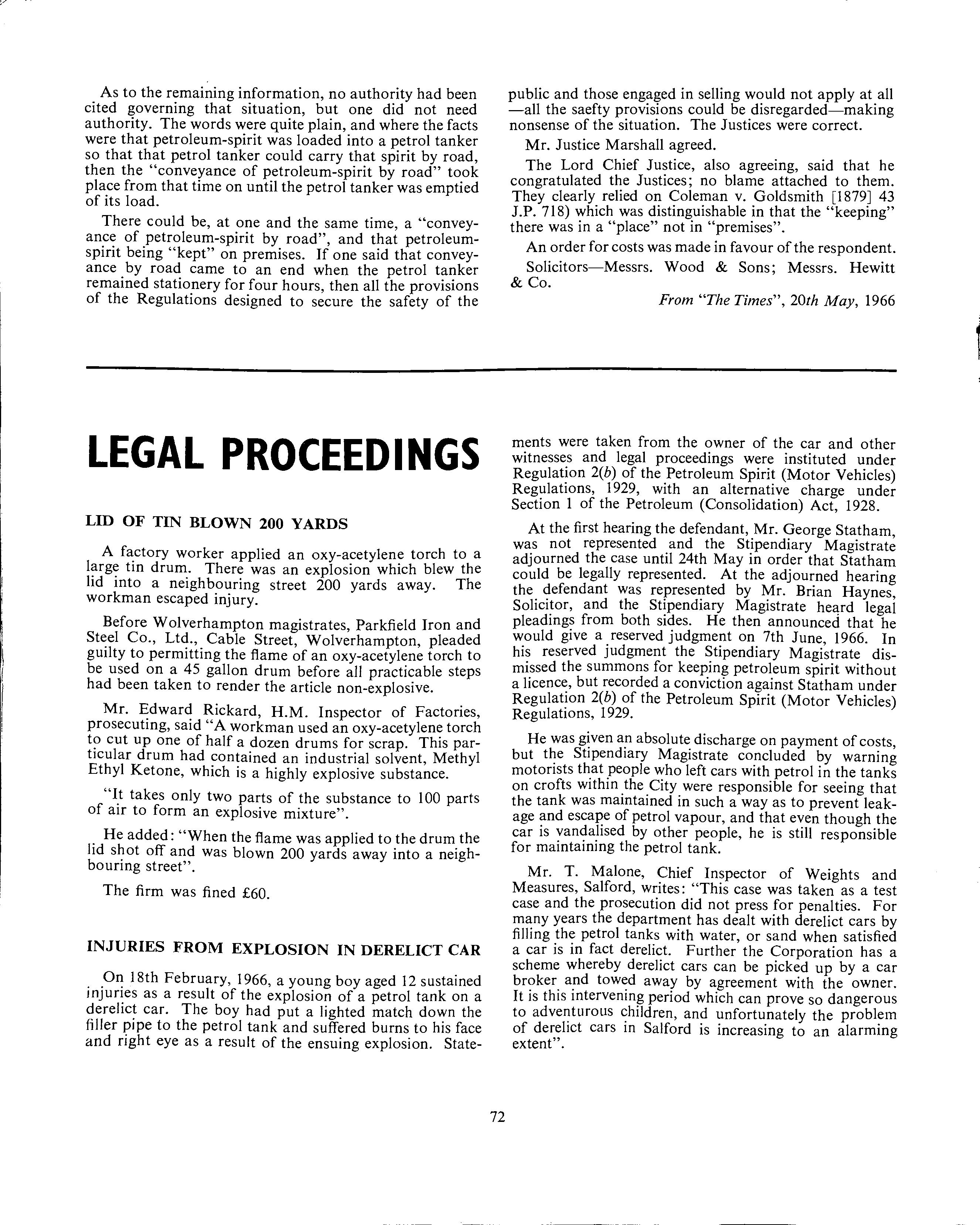
INJURIES FROM EXPLOSION IN DERELICT CAR
On 18th February, 1966, a young boy aged 12 sustained injuries as a result of the explosion of a petrol tank on a derelict car. The boy had put a lighted match down the filler pipe to the petrol tank and suffered burns to his face and right eye as a result of the ensuing explosion. Statepublic and those engaged in selling would not apply at all -all the saefty provisions could be disregarded-making nonsense of the situation. The Justices were correct.
Mr. Justice Marshall agreed.
The Lord Chief Justice, also agreeing, said that he congratulated the Justices; no blame attached to them. They clearly relied on Coleman v. Goldsmith [1879] 43 J.P. 718) which was distinguishable in that the "keeping" there was in a "place" not in "premises".
An order for costs was made in favour of the respondent.
Solicitors-Messrs. Wood & Sons; Messrs. Hewitt &Co.
ments were taken from the owner of the car and other witnesses and legal proceedings were instituted under Regulation 2(b) of the Petroleum Spirit (Motor Vehicles) Regulations, 1929, with an alternative charge under Section 1 of the Petroleum (Consolidation) Act, 1928.
At the first hearing the defendant, Mr. George Statham, was not represented and the Stipendiary Magistrate adjourned the case until 24th May in order that Statham could be legally represented. At the adjourned hearing the defendant was represented by Mr. Brian Haynes, Solicitor, and the Stipendiary Magistrate hea,rd legal pleadings from both sides. He then announced that he would give a reserved judgment on 7th June, 1966. In his reserved judgment the Stipendiary Magistrate dismissed the summons for keeping petroleum spirit without a licence, but recorded a conviction against Statham under Regulation 2(b) of the Petroleum Spirit (Motor Vehicles) Regulations, 1929.
He was given an absolute discharge on payment of costs, but the Stipendiary Magistrate concluded by warning motorists that people who left cars with petrol in the tanks on crofts within the City were responsible for seeing that the tank was maintained in such a way as to prevent leakage and escape of petrol vapour, and that even though the car is vandalised by other people, he is still responsible for maintaining the petrol tank.
Mr. T. Malone, Chief Inspector of Weights and Measures, Salford, writes: "This case was taken as a test case and the prosecution did not press for penalties. For many years the department has dealt with derelict cars by filling the petrol tanks with water, or sand when satisfied a car is in fact derelict. Further the Corporation has a scheme whereby derelict cars can be picked up by a car broker and towed away by agreement with the owner. It is this intervening period which can prove so dangerous to adventurous children, and unfortunately the problem of derelict cars in Salford is increasing to an alarming extent".
72
Telephone: EASt 0428
W. J. FINCH (Installations) Ltd.
Complete petrol and fuel oil bulk storage tank installations.
Pressure testing tanks and pipe work.
Steaming out and de-gassing petrol tanks; issuing gas free certificates.
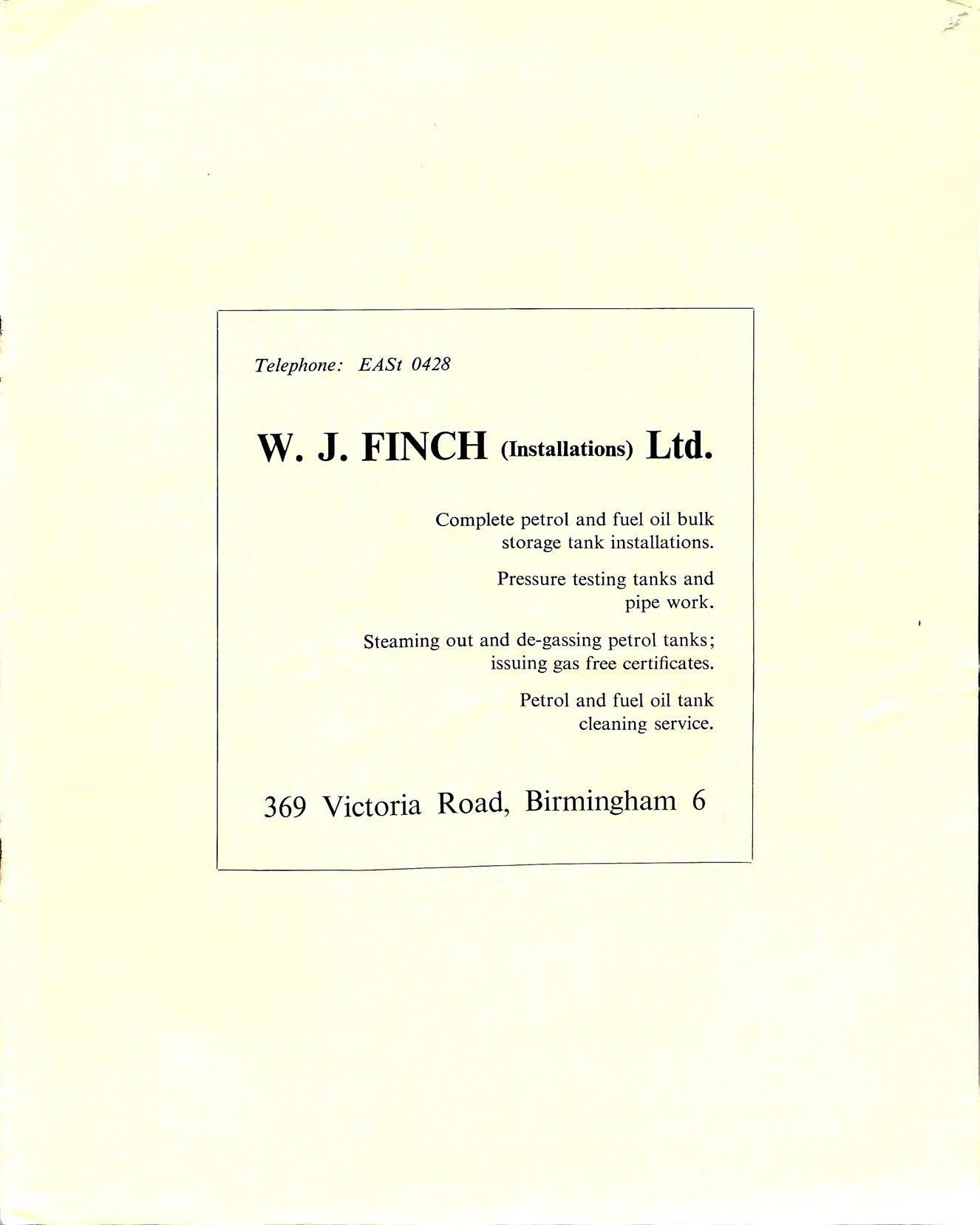
Petrol and fuel oil tank cleaning service.










